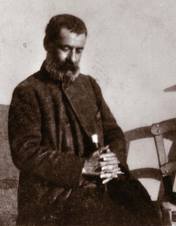
Alexandros Papadiamandis
1851-1911
The photograph of Papadiamandis was taken in Athens, circa 1905.
Alexandros Papadiamandis was born on 4 March 1851 on the small island of Skiathos just off the north-east coast of Evia (Euboea). His father, the priest Adamandios Emmanuel — familiarly addressed as Papa-Diamandis — came from a nautical family which in earlier years had counted monastics and abbots amongst its members. His parents had nine children, two of which died at birth. Alexandros was their fourth child and eldest living son.
The young Alexandros had a diverse and interrupted education. He was schooled on his island until the age of eleven but as there were no further classes offered and because of his family's economic constraints he spent the next three years mainly helping his father in his pastoral duties. In the following years he went to a further four schools, on nearby islands and then on the mainland, and eventually, in 1874, registered at the Philosophical School of the University of Athens. He attended the University for two years but he was never to obtain his degree. It was during this period that his cousin, Alexandros Moraitidis, introduced him into various journalistic circles.
Following the recommendation of one of his new journalistic acquaintances, Papadiamandis’s first novel, entitled The Migrant, was printed in instalments in the Constantinopolitan newspaper Neologos, in 1879, and a further three novels were similarly published in Athens in the following years. It was also during this period that, after a short conscription in the army, he started working as a translator for various Athenian newspapers.
It wasn’t, however, until Christmas of 1887 that Papadiamandis’s first short story, 'The Christmas Loaf', was to appear, marking the feast and setting a pattern for his writing. The metier of the short story subsequently became his favoured form, and no doubt it was an easier form for him to accommodate within his inordinately long working days. Many of these hours were spent in translating major European novels, such as Crime and Punishment, Quo Vadis, Dracula, and The Manxman, which appeared in daily instalments, as well as numerous short stories by such writers as Chekhov, Bret Harte and Jerome K. Jerome, in addition to translating works of non-fiction. He relieved the incredible strain he subjected himself to by frequenting wine shops and chain-smoking but these all too human habits did not prevent him from regularly attending church services in which he acted as chanter and beadle.
It was in 1887 that he found what could be described as his spiritual bolt-hole in the turbulent and often harsh world of the metropolis: the small church of the Prophet Elisha, set in the courtyard of a private house in the old part of the city, under the rock of the Acropolis. There Papa-Nicholaos Planas, a simple priest born in the same year as Papadiamandis, a man of prayer and of great spiritual gifts, would regularly hold vigil services, gathering people from all walks of life into the crucible of the little church. Papa-Nicholaos was canonized in 1992.
Papadiamandis never married. He was a shy and retiring man, as the few extant photographs of him testify, a man seemingly not of this world despite his acute observations of it. He also had to provide for his unmarried sisters at home. But despite his introspective nature he had a small circle of close friends, including Pavlos Nirvanas and Yannis Vlachoyannis, well-known Athenian men of letters who on various occasions undertook the role of literary agents and helped him during hard times.
Except for two years when he returned to Skiathos, 1902–4, during which time he wrote his perhaps most powerful tale, The Murderess, he continued to live in Athens, writing and translating, until 1908. That year, in March, the Parnassos literary society held an event in his honour under the patronage of Princess Maria Bonaparte: typically Papadiamandis was not present and spent the evening dining with the family of his grocer friend.
Shortly afterwards he returned to Skiathos where he lived from then on, cared for in turn by his sisters. He died from a chest infection — most probably pneumonia — on 2 January 1911.
A critical edition of Papadiamandis’s collected works, edited by N. D. Triandaphyllopoulos, is available in Greek: Apanda, 5 vols. (Athens: Domos Publications, 1981–88).
Texts & References on this site
- The Boundless Garden: Selected Short Stories Volume I, contains translations of sixteen stories by Papadiamandis.
- The Drama of Quality: Selected Essays includes two essays by Zissimos Lorenzatos, ‘Alexandros Papadiamandis I, Fifty Years On’ and ‘Alexandros Papadiamandis II’, pp. 7–28.
- Love in the Snow: English Translation with Greek Text, a classic short story by Papadiamandis.
- The Murderess: A Social Tale, a new translation of what is considered to be Papadiamandis's finest work, published to mark the centenary of the author's death.
- Around the Lagoon: Reminiscences to a Friend: A Bilingual Edition, one of Papadiamandis's most finely crafted stories, translated and introduced by Peter Mackridge
- The Boundless Garden: Volume II: Selected Short Stories